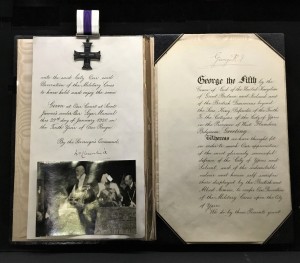On Duty Throughout

The 1920 Military Cross, presentation photograph and document presented to Ypres on exhibit at the In Flanders Fields Museum, Ieper (Ypres), Belgium.
(P. Ferguson image, November 2018)
Carved into the Lessons from History
On 14 April 2020 the Daily Express presented the suggestion, made by Mr. Terence McIlroy, that in recognition of the bravery of the British National Health Service (NHS), during the Covid-19 pandemic, that the organization could be presented with the honorific award of the George Medal. Although the article states that the George Medal is the highest award for civilian gallantry the George Cross is the Medal’s senior. Regardless, the thought is well-intentioned and will, perhaps, receive some consideration in British circles that govern such honours.
Mr. McIlroy’s article provides precedence for such an award noting that the Mediterranean island of Malta received the George Cross in 1942 and so too the Royal Ulster Constabulary in 1999. Both awards recognized the gallantry of its citizens and personnel in times of great adversity.
Additionally, British combat awards have been made to three cities of the Great War. Both Verdun (France) and Ypres (Belgium) were awarded the Military Cross. Verdun received the award in 1916 and the city of Ypres was so honoured in 1920. Five years later Ypres added the Military Cross and the Great War award of the French Croix de Guerre into their city’s coat of arms.
A third combat award, the Distinguished Service Cross, was granted to Dunkirk, France in recognition of its citizen’s gallantry during the Great War. Awarded in 1919 the award is also included in the present-day coat of arms of the city that further includes the French Medal of Honour and two Croix de Guerres, the latter two presented for gallantry during both the First and Second World Wars.
The care-providers of the National Health Service have shown tremendous determination, resolve, and resilience. By doing what they do and through their compassion and empathy they have carved into the lessons from history, an enduring pride for future generations. This is so true of all earth’s care givers, in all countries, going above and beyond…as doctors, nurses, technicians, cleaners, providers…and at times as surrogate family…Who has not shed a tear amidst all their stories?…They will continue to stand together…they are on duty throughout.
As of 13 April 2020, testing of 16,888 British National Health Service staff has diagnosed 5,733 Covid-19 test positive results. At least 35 of their brothers and sisters have died in the fight against this contagion.

Comments